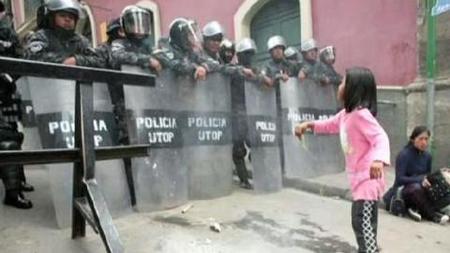Pictured: Carlos Cachari Ticona signing in to lobby for relaxing child labor laws CREDIT: REUTERS
Bolivia recently passed a law which reduces the minimum age of employment from 14 years old to 10. The law offers some protections to children who decide to work, such as parents being required to supervise those between 10 and twelve. Also, those under 12 are not allowed to work for third party employers and they must all still attend school while working.
The Guardian headline is predictably overly dramatic, reading: “Bolivia’s child labor law shames us all.” But the real people who ought to be ashamed are the author of the piece and the editor who approved it.
From the piece:
Without a proscription on child labour, the limits on what is permissible are likely to become blurred and then extended. It is not fanciful to worry that this law could lead to a greater regional acceptance of child labour, making it harder to eradicate.
But Bolivia is not an isolated example. Since 2005, the number of child slaves remains at about 5.5 million. This suggests that many of the most difficult and entrenched manifestations of child exploitation have not been addressed.
Of course, it’s a short leap from having a job working for your parents… to full blown slavery! Predictably there are very little unbiased resources which detail the struggle of Bolivians to implement this law. However, one voice did speak out clearly for economic freedom in his own country.

Carlos Cachari Ticona, 12, is the leader of Bolivia’s Union of Child and Adolescent Workers and was an important voice in passing the legislation that would allow children the freedom of choice. His group, UNATSBO, were pepper sprayed while protesting in support of the law outside of the presidential palace.
President Evo Morales sympathized with the young people who were desperate to help supplement the income of their impoverished families. Morales stated that he believed that child labor was a necessity born of poverty, but that it can also help build a social conscience. President Morales was said to have worked many odd jobs as a child, harvesting sugarcane and selling ice cream amongst other things.
While some would cry out “sweatshops,” the reality is far different. Many young people in Bolivia go to work doing things such as shining shoes, selling trinkets or collecting bus fares. These are good jobs that are not dangerous and can build character while supplementing the income of poor to middle income families who may rely heavily on the extra money. It’s poor form for governments to outlaw this kind of work, simply because of the emotional arguments against the possibility of “child exploitation.”
Marxist sociologist James Petras heavily opposed the measure. He accused President Morales of trying to create a “reserve army” of exploited children who will depress wages and replace militant adults in the labor force. The Director of Anti-Slavery International wrote Morales a similarly strongly-worded letter, saying: “… reduction in minimum age would only accentuate the chances of the children of your country being more susceptible to trafficking, slavery, servitude, forced labour and violence.
Still, not everyone in Bolivia is so convinced that children are about to become slaves.
Rodrigo Medrano Calle is a Bolivian labor leader who argues that his constituents (he is 14-years-old) deserve the right to work. “I started working when I was nine, and I’ve done everything, shining shoes, bus driver’s assistant, selling. I’ve gone through most of the jobs common for child and adolescent workers,” said Rodrigo, making $6-$7 for a night’s work. “I lived on the street for a time and was going in the wrong direction, but then I found the movement, and it gave me a reason to be. I’m going to fight for my compañeros’ rights, not just my own.”
An adult counselor for UNATSBO, Luz Rivera Daza, argues that it is better for child workers to be legal, so they at least have some protections when they are working, rather than to do so illegally. “If you have to work, then you have to work exploited,” she said. “This just makes you more vulnerable.”
“Why should there be a minimum age if the work is voluntary?” Rodrigo asked. “The work of a child or adolescent is not bad – it helps society, it helps a family, and it helps us grow as people.”
[about_austin]


2 comments